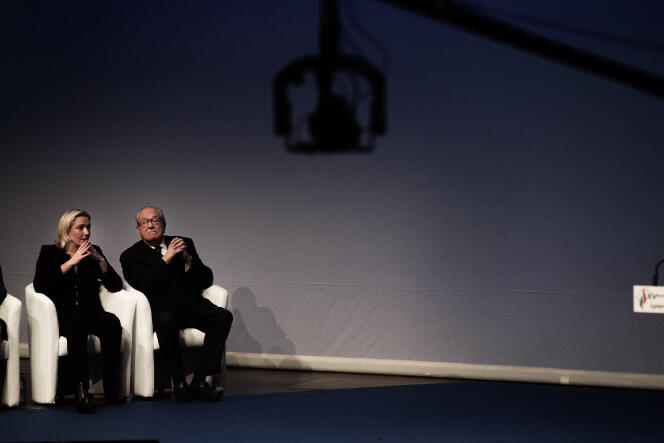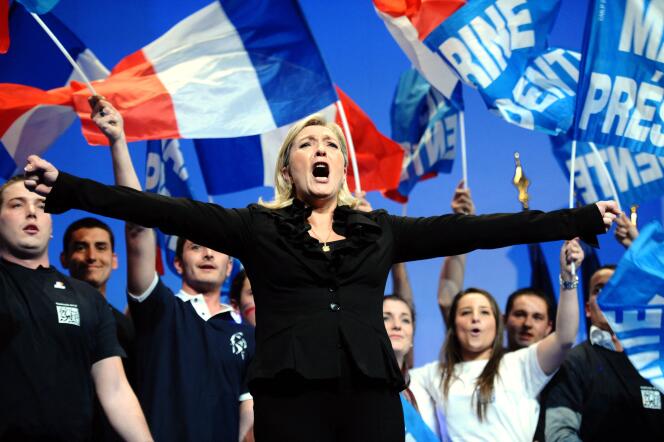
There was no critical examination of the past of the Front National (FN), which became the Rassemblement National (RN) in 2018. To celebrate the 50th anniversary of the founding of the FN on October 5, the far-right party did not have high ambitions. Its only event to mark the date took place the next day. It was a conference held at the Assemblée Nationale to list the party's various "contributions to the French political debate."
The party preferred to avoid any touchy issues or people, including the two living co-founders, Alain Robert and Jean-Marie Le Pen, neither or whom were invited. It barely touched on the 40 years during which the party was led by Mr. Le Pen, who made the tiny group founded by neo-fascists one of France's main political parties despite his racist, anti-Semitic and Holocaust-denying provocations. And the conference did not touch on the evolution of party that has been in turn reactionary and conservative, pro-American and pro-Russian, Reaganite and protectionist, loathing of the French Revolution and self-proclaimed Republican. The ideological reversals led by Marine Le Pen over the last 10 years – the most spectacular being her U-turn on droppig the euro and leaving the European Union – were not mentioned either.
These days, Ms. Le Pen plays the card of quiet strength. She has no need for speaking loudly, she waits for things to happen. The situation is favorable, for her. Her score in the presidential election and the left's faintness have reinforced her status as the main opponent to a weakened government that only has a relative majority in the Assemblée Nationale.
On her horizon, there is the November 5 party congress after which the party will be led by someone not named Le Pen for the first time in its history. For her, that will be a liberation. The candidates to succeed her are current interim president Jordan Bardella and Mayor of Perpignan Louis Aliot, both close allies. Whoever wins, Ms. Le Pen will keep leading her party's group at the Assemblée Nationale, the RN's new seat of power. They hold 89 seats, two vice-presidencies, and one seat on the intelligence committee. Never in French history has a far-right group held so much power in a Republican institution.
'A national, popular and social right wing'
Ms. Le Pen's ambiguity toward her party's past was revealed by the decision to hold this low-key event, and by the ommitted topics.
The style has changed, but the substance is the same. Ms. Le Pen insists that the RN is different from the FN, that the party has evolved, that is has left behind her father's racist and anti-Semitic. But the core of the ideology she defends is unchanged, particularly with regard to immigration, globalisation, and her vision of France and its presumed lost grandeur. Some obsessions have disappeared: are anti-communism, the defense of the traditional family model, the anti-abortion fight and the restoration of the death penalty.

But none of the movement's fundamentals have been repudiated, first and foremost among them the "national preference," which was renamed as "national priority" 10 years ago – the idea being to give French citizens priority for jobs, social assistance and housing. Ms. Le Pen does not want to give up on this policy event though it is contrary to the French constitution. Jean-Marie Le Pen, who was not invited to the conference, is pleased with this and salutes his daughter's skill: "The RN is putting forward the FN's traditional proposals. The line of the national, popular and social right is held. Insisting on purchasing power is an effective technique for de-demonization, because taking the debate out of politics protects you from confrontation."
This strategy is yet another molting for the 50-year-old party: The skin changes, but the structure remains. "The FN is, ideologically, extremely plastic. What counts for its activists is its general vision of the world and its organic conception of the nation," said Nicolas Lebourg, a historian of the far right. "Consequently, its only program is to govern. The FN acts as a receptacle of grievances, of discontent."
Identity as a base
There is no photo from the birth of the Front National pour l'Unité Française – the party's first official name – on October 5, 1972. That day, a private rally was held in Paris based on the suggestion Ordre Nouveau, a neo-fascist organization. Its leader, Alain Robert, wanted to create a more "presentable" political structure and achieve the French far right's old dream: unity. And so was born the "national front" strategy.
To bring these mutually hostile sides together, who better than a former lawmaker, a veteran of the Indochina and Algeria wars, and former follower of the reactionary Pierre Poujade? In short, a has-been, who seemed to have his political career behind him. The choice fell on Mr. Le Pen. Mr. Robert wanted to make the former president of La Corpo – an organization of law students – into a puppet. But Mr. Le Pen ignored the plans that others had for him: He would soon be the only one in charge. In the meantime, he was flanked by a group of former Nazi collaborationists and some former pro-French Algeria resistance fighters.
What remains today of the original FN, Mr. Le Pen's FN? "Many things, but essentially the idea of the nation," claims Ms. Le Pen. "At a time when everyone was enthusiastic about supranational structures, the FN made the nation the heart of its political vision. The place where we disseminate ourselves, where we flourish, the place that protects us."
Party vice president Sébastien Chenu, who only joined in 2014, noted how this idea of the nation acts as a kind of glue: "Voters have accepted these changes because they are attached to the identity of France. It is our common base, including language, territorial cohesion, social heritage, and the question of sovereignty. But no ethnic dimension."
'Marine Le Pen has turned down the volume'
It would be simplistic to boil the history of the FN/RN down to the two figures of Jean-Marie Le Pen and Marine Le Pen and distinguish them as an outrageous, protesting and radical Front National and a de-demonized, almost credible Rassemblement National.

At the end of the 1990s, Bruno Mégret unsuccessfully tried to make the FN a more mainstream party, amenable to alliances with the right. And while Ms. Le Pen was convinced very early on that the correct position to defend was more social and critical of globalization, her second-in-command from 2011 to 2017, Florian Philippot, bolstered that strategic choice by adding a major change: a positive reference to Charles de Gaulle, a figure hitherto hated by the FN.
Under Ms. Le Pen's leadership, the strategy of de-demonization was accompanied by new semantics, an essential weapon in the political battle. "Marine Le Pen has turned down the volume of the FN's discourse, lowering the outrageousness and the hyperbole to fit the norm of political discourse," said Cécile Alduy, a professor at Stanford University, who specializes in the analysis of far-right discourse. "At the same time, she erased everything that went against the cultural movement of France, at a time when a dominant ideology condemning racism and inequality was holding sway. In order to capture the zeitgeist, she adopted this broad consensus and cast it into the ideological background of the FN. Words that sound modern and Republican are used, but only applied to the fight against immigration."
This shift represents a "double victory," said sociologist Sylvain Crépon. The first is a victory of "the Republican fundamentals, seeing as the RN formulates its nationalist ideology with words that conform to universalist principles." The second is a victory of the RN, since it "imposed its themes on society as a whole, notably the link between immigration and crime."
But every strategy has its limits. This is true for the strategy of de-demonization, which can end up resembling a normalisation. A major risk for the RN is that if it is seen as an identarian political party, then it is part of the system. And it could lose its specificity.